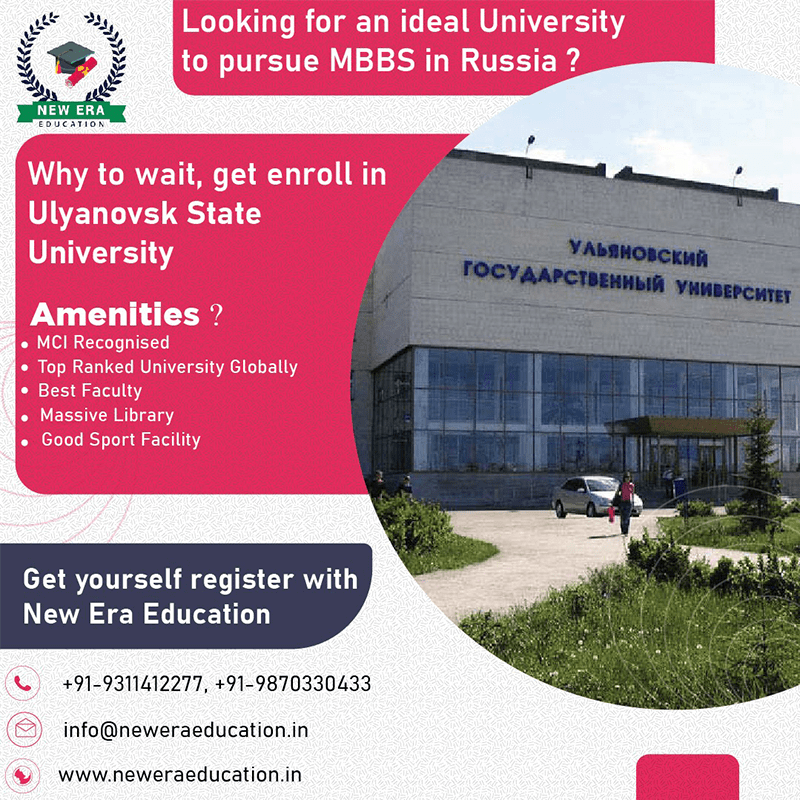A Comprehensive Guide to Pursuing MBBS in Russia: Everything You Need to Know (Communities - Education)

Item ID 2341149 in Category: Communities - Education
A Comprehensive Guide to Pursuing MBBS in Russia: Everything You Need to Know | |
Introduction to pursuing MBBS in Russia Studying medicine abroad has become an increasingly popular option for students aspiring to pursue a career in healthcare. One country that has gained significant attention in recent years is Russia. With its world-class medical universities and affordable education, pursuing MBBS in Russia has become a favorable choice for many international students. Russia is renowned for its high standards of medical education and state-of-the-art infrastructure. The country boasts a rich history of producing highly skilled doctors and medical professionals. In this comprehensive guide, we will explore all aspects of pursuing MBBS in Russia, including the advantages, admission process, top universities, cost of studying, scholarships, living and accommodation, curriculum, clinical training, career opportunities, challenges, and frequently asked questions. Advantages of studying MBBS in Russia Studying MBBS in Russia offers numerous advantages for international students. Firstly, the country is home to some of the best medical universities in the world, renowned for their high academic standards and modern facilities. These universities follow the latest advancements in medical research and technology, ensuring that students receive a comprehensive education. Secondly, pursuing MBBS in Russia is significantly more affordable compared to many other countries. The cost of education, including tuition fees and living expenses, is relatively low, making it an attractive option for students with limited financial resources. Moreover, the cost of living in Russia is comparatively lower than in other European countries, allowing students to comfortably manage their expenses. Another advantage of studying MBBS in Russia is the multicultural environment. Russian universities welcome students from various countries, creating a diverse and inclusive atmosphere. This multicultural setting provides students with the opportunity to interact with peers from different backgrounds, fostering cultural understanding and global networking. Overview of medical education system in Russia The medical education system in Russia is highly regarded worldwide. It follows a well-structured curriculum that combines theoretical knowledge with practical training. The duration of the MBBS program is six years, which includes a combination of classroom lectures, laboratory work, and clinical training. The first three years of the program focus on building a strong foundation in basic medical sciences such as anatomy, physiology, biochemistry, and pharmacology. Students are exposed to a rigorous academic curriculum that lays the groundwork for their future clinical practice. The next three years are dedicated to clinical rotations, where students gain hands-on experience in various departments of hospitals and clinics. Russian medical universities place great emphasis on practical training to ensure that students are well-prepared to handle real-life medical scenarios. This practical approach helps students develop critical thinking, problem-solving, and decision-making skills, which are vital for a successful career in medicine. Admission process for MBBS in Russia The admission process for MBBS in Russia is straightforward and transparent. Most universities in Russia do not require students to appear for any entrance examinations. Instead, admission is based on the marks obtained in the qualifying examinations, such as the 10+2 level or equivalent. To apply for MBBS in Russia, students need to submit their academic transcripts, a copy of their passport, and a completed application form to the university of their choice. It is advisable to start the application process well in advance to secure a seat in the desired university. Once the application is reviewed and accepted, the university will issue an invitation letter, which is required to obtain a student visa. It is essential to note that some universities may conduct interviews or additional screening processes to assess the suitability of candidates. However, these requirements vary from university to university, and it is advisable to check the specific admission criteria of each institution.  | |
| Related Link: Click here to visit item owner's website (1 hit) | |
| Target State: All States Target City : Delhi Last Update : 05 January 2024 5:30 PM Number of Views: 47 | Item Owner : Ali Munawar Contact Email: Contact Phone: (None) |
| Friendly reminder: Click here to read some tips. | |
© 2024 AUNetAds.com
USNetAds.com | GetJob.us | CANetAds.com | UKAdsList.com | INNetAds.com | CNNetAds.com | Hot-Web-Ads.com | USAOnlineClassifieds.com
2024-05-04 (0.227 sec)